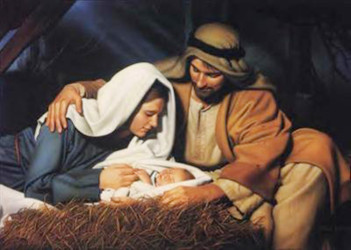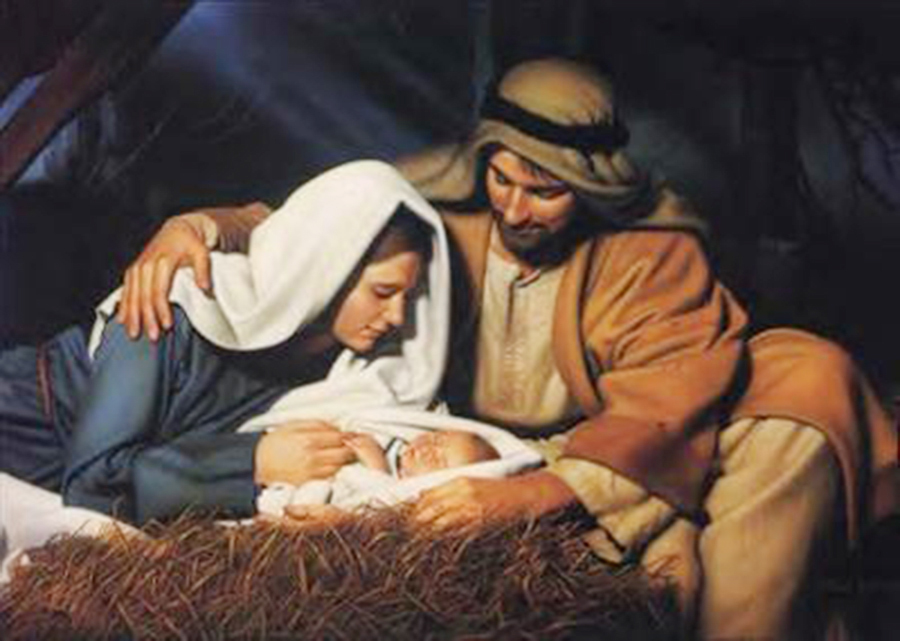These nativity musings have to do specifically with the Birth of the Jesus Child, who eventually was to become the Christ – the One sent and anointed to become a Messiah.
Jewish prophecy predicted that this Jesus Child was to be an earthly Divine Ruler, a Messianic Saviour and Deliverer.
No wonder the Birth of such a Child has attracted numerous, lasting, even inconclusive studies, analyses, even controversies. Because the Baby, the child, the Adult, who became many people’s Christ, inspired a religion. Even though He couldn’t have known what He started. Even when He told the earliest apostle(s) He would make them Fishers of men.
 Exposed to the basic teachings of Christianity – from various churches – and although not an active Christian myself, I’m never-the-less still somewhat mesmerised by Jesus’ birth and early entrance into the world of His earthly times. What miracles, what drama. Christian Believer or not, be introduced, or be reminded of the following.
Exposed to the basic teachings of Christianity – from various churches – and although not an active Christian myself, I’m never-the-less still somewhat mesmerised by Jesus’ birth and early entrance into the world of His earthly times. What miracles, what drama. Christian Believer or not, be introduced, or be reminded of the following.
The parents, Joseph and Mary
Interestingly, both those who wish to define Jesus’ race and those who claim that it’s not important, seldom enquire as to His parents’ ethnicity – ethnicity both in terms of race and cultural identity and practices.
We are told that the male “parent” Joseph was from the city of Nazareth (a portion of Galilee). He was of the “house and lineage” of David. Surely, we of today can ascertain the ethnic and physical characteristics to realise that they were not as European/Caucasian as is usually depicted. Joseph’s teenaged fiancé Mary was, seemingly from the same area.
Poor Joseph. When he discovered that his young wife-to-be was pregnant, the poor hard-working carpenter was devastated. For noble and gentleman that he was, he had not yet “known her.” He wondered about the young lady’s faithfulness as against his widely-known honour. Reluctantly, he chose to “divorce” her as he was being the subject of “tantalise” and mockery, especially from his adult peers in the community.
However, an Angel of the Lord/God appeared to him explaining that he Joseph, as a “father” was destined to shoulder a defining role as the father of the Son of God: “Joseph, thou son of David, fear not to take unto thee, Mary, thy wife, for that which is conceived in her is of the Holy Ghost.”
And that Divine Intervention influenced Joseph to protect his younger companion from “public shame” and ridicule. He was on his way to becoming one of history’s glorious parents.
What a Father he was! When one of the Caesars (Augustus) of Rome decreed that all in the Empire should be counted and taxed, Joseph had to leave Nazareth in Galilee and journey to Bethlehem in Judea to comply. But Mary was ready to give birth. Bethlehem’s better hotels, guest houses, inns were packed. In a panic, the carpenter had to settle for an animal stable, thereby creating a manger as the most humble delivery room for lowly shepherds to visit after the Birth.
When the evil Herod, the local king, fearing that some new-born king would usurp his dominion, ordered that all male infants be killed, Joseph had to hurry with Mary and Jesus all the way to Egypt, North Africa, for safety. Joseph was later to return to “the land of Israel” and eventually to Nazareth where Jesus grew up to be a Nazarene and revolutionary preacher.
So much of fatherhood and nobility, missing these days, could be learnt from Joseph’s exemplary fatherhood of sacrifice. That is another time and space.
Relatively little is known of Mary, the Virgin Girl chosen to bear the Son of God. Why her? Even the angels and messengers of God chose to explain to others – her spouse Joseph, the shepherds, the three Eastern Kings, the prophets – that she was destined for greatness through her divine motherhood. She was merely informed.
The two Bible Gospel writers, Matthew and Luke, seemed to be the most interested in the Birth of Jesus, much more than the other two. One can explore their records and decide how much to believe; to analyse and conclude.
They traced Mary’s travails going to christen him after birth; to hide in Egypt and elsewhere and to seek maternal assistance from the few females she knew.
Mary also had to cope with the strange traits of this Divine Son. He was an apprentice carpenter to his father yes, but he seemed more intent on intellectual and spiritual pursuits. On trips to Jerusalem, the sometimes disobedient fellow would disappear to listen and to engage adult academic lawyers, doctors, preachers. She however marveled at the teenager’s debating prowess, even as she rebuked him. We can only surmise all that this now-matured, sometimes mystified country-girl mother, encountered as she experiences her Son’s journey through a life prophesied.
The Baby was named Jesus, even before birth! (Luke 1:31). He was also hailed as Emmanuel – “God amongst us.” Perhaps strangely, Luke (2:7) speaks of Jesus being Mary’s first-born baby, suggesting strongly that she birthed others after Him.
Well we now know if, as Christians must do, we believe Biblical accounts that the Baby became rebellious to Rome and mankind’s sins. He was to become Christendom’s Sacrifice for us all.
Today’s Christ, donkeys – and Africa
My musings on this “Christmas Day” end with “troubled thoughts of hope.”
Jesus Christ’s very existence, then his life and role are even now being subjected to rigorous investigation, revision, doubt. But much of the world still needs Him as a Messiah and Saviour – the bedrock of love, unity and peace.
Peace? Jesus travelled across the Middle East, he reportedly spent time in India. His homeland areas are now awash in blood and bombs. As He was as an infant, millions are refugees! Those displaced peoples use boats, trains and feet to seek peace. Jesus used donkeys. What a peaceful, useful animal of history. Let us love lowly animals. They behave and serve better than some of us do!
Let us also reflect on the role of that portion of our planet described as Africa. It offered safety and security to a Baby Jesus. Evolutionists claim that any Garden of Eden might have to be located in Africa, from whence man “evolved.”
Have a reflective Christmas Season 2015. As Christians and the wider world hope that the Birth and Life of the Baby Jesus were not in vain.










